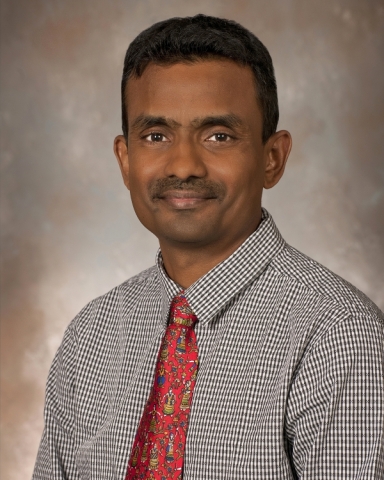Program Director
Tharun Sundaresan, Ph.d
Department of Primary Appointment: School of Medicine, Biochemistry
Title - Associate Professor
Research Interests: Mechanism of mRNA decay; Molecular basis of cancer
https://www.usuhs.edu/bio/faculty-staff
Education
Ph.D. (Life Sciences) - Centre for Cellular and Molecular Biology (CCMB), Hyderabad, India (Affiliated to Jawaharlal Nehru University, New Delhi, India).
Representative publications, projects, and/or deployments
Tharun, S and Parker, R. 1995. Mechanisms of mRNA Turnover in Eukaryotic Cells. In Modern Biology Series vol:17 (mRNA metabolism and post-transcriptional gene regulation), p181-199. Ed. Harford, J.B., and Morris, D.R. John Wiley Publishers.
Tharun, S and Parker, R. 1999. Turnover of mRNA in eukaryotic cells. In Comprehensive natural products chemistry vol:6 (Prebiotic chemistry, molecular fossils, nucleosides and RNA), p205-216. Ed. Barton, S.D and Nakanishi, K. Pergamon Publishers.
Tharun, S. 2009. Lsm1-7-Pat1 complex: A link between 3’ and 5’-ends in mRNA decay? RNA Biology, 6(3):228-232.
Tharun, S. 2009. Roles of eukaryotic Lsm proteins in the regulation of mRNA function. International Review of Cell & Molecular Biology, 272:149-189.
HHMI Fellowship; American Cancer Society IRG grant; NIH RO1 Research project grant; USUHS Exploratory grant
Faculty (secondary appointment), Molecular Cell Biology Graduate Program, Uniformed Services University of the Health Sciences.
Course Director, Graduate Biochemistry course, Uniformed Services University of the Health Sciences.
Bibliography
Chowdhury, A, Swathi Kalurupalle, S and Tharun, S*. 2016. Mutagenic analysis of the C-terminal domain of Lsm1. PLoS ONE, 11: e0158876.
Jungfleisch, J., Chowdhury, A, Alves-Rodrigues, I, Tharun, S* and Juana Díez. 2015. The Lsm1-7-Pat1 complex promotes viral RNA translation and replication by 3 differential mechanisms. RNA, 21:1469–1479.
Chowdhury, A, Kalurupalle, S, and Tharun, S*. 2014. Pat1 contributes to the RNA binding activity of the Lsm1-7-Pat1 complex. RNA, 20:1465–1475.
Chowdhury, A, Raju, KK, Kalurupalle, S and Tharun, S*. 2012. Both Sm-domain and C-terminal extension of Lsm1 are important for the RNA-binding activity of the Lsm1–7–Pat1 complex. RNA, 18:936–944.
Chowdhury, A, and Tharun, S*. 2009. Activation of decapping involves binding of the mRNA and facilitation of the post-binding steps by the Lsm1-7-Pat1 complex. RNA, 15:1837–1848.
Tharun, S. 2008. Purification and analysis of the decapping activator Lsm1p-7p-Pat1p complex from yeast. Methods in Enzymology, 448:41-55.
Chowdhury, A, and Tharun, S*. 2008. lsm1 mutations impairing the ability of the Lsm1p-7p-Pat1p complex to preferentially bind to oligoadenylated RNA affect mRNA decay in vivo. RNA, 14:2149-2158.
Chowdhury, A, Mukhopadhyay, J. and Tharun, S*. 2007. The decapping activator Lsm1p-7p-Pat1p complex has the intrinsic ability to distinguish between oligoadenylated and polyadenylated RNAs. RNA, 13:998-1016.
Tharun S*, Muhlrad D, Chowdhury A and Parker R. 2005. Mutations in the Saccharomyces cerevisiae LSM1 gene that affect mRNA decapping and 3' end protection. Genetics, 170:33-46. *Corresponding author
Tharun, S* and Parker R. 2001. Targeting an mRNA for decapping: Displacement of translation factors and association of the Lsm1p-7p complex on deadenylated yeast mRNAs. Molecular Cell, 8:1075-1083. *Corresponding author

